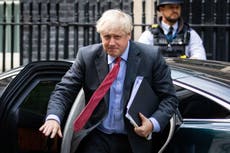Six months on, Boris Johnson’s Britain is fractured
Since the initial lockdown, mixed governement messages and constant flip-flopping on rules have caused frustration and anger. Other countries have done a far better job in limiting health and economic harm

Half a year ago today, Boris Johnson announced a national lockdown. The country is in a very different place as the second wave of coronavirus restrictions takes effect.
The political and scientific consensus that existed in March has broken down. Conservative MPs, worried about the economic impact and infringement of people’s liberties, tell party whips they will not stomach a second full lockdown. Labour, while supporting individual measures, paints an accurate picture of government incompetence. In his Labour conference speech, Keir Starmer declared Johnson “not up to the job”.
Scientists argue openly among themselves; some think Johnson is going too far, others not far enough. This suits the prime minister, who invited two lockdown sceptics from Oxford University to brief him and his key ministers as they agonised over the package, which emerged yesterday.
Missing, too, is the sense of public unity that meant the vast majority initially followed the rules – now fractured amid frustration, anger, and confusion over constantly changing rules and mixed government messages (not least on working from home) and in some cases the inability to afford 14 days of self-isolation.
In his TV broadcast last night, Johnson tried to recreate the “discipline, resolve and spirit of togetherness” of phase one and deployed Churchillian rhetoric. But he will struggle to put the “all in it together” genie back in the bottle. Today people are less willing to give the government the benefit of the doubt than they were at the outset; although the crisis is unprecedented, they know that other countries have made a better fist of limiting the health and economic harm.
Unity across the UK’s four nations has gone too. The SNP Scottish government, by banning indoor meetings between people from two households, acted in line with Monday’s grim warnings about the threat from the virus by Johnson’s medical and scientific advisers. He did not.
Johnson’s measures were diluted after pushback from Rishi Sunak, the chancellor and, crucially, by Tory backbenchers, some of whom were reassured by Downing Street that their voice has been heard. Johnson’s existing party management problem, partly as a result of treating his MPs with disdain since last December’s election, meant he did not want to risk another big Tory rebellion.
However, it was not a total victory for Sunak. He will now have to bow to pressure to find a successor to his furlough scheme when it ends next month. It will be politically impossible to withdraw all support while the government is kicking industries like hospitality just as they struggle to get off the floor. The chancellor has repeatedly ruled out an extension, but restrictions such as closing pubs and restaurants at 10pm mean that some wage subsidies will be needed in the hardest hit sectors. One idea is for the government to pay the wages of those on short time when they are not working.
For now, the “economy first” brigade on the Tory backbenchers are relieved that more stringent measures were dropped – including a “circuit-breaker” of tough controls for a two or three week period aimed at halting the spread of the virus. But their joy might be short-lived. I’m told that some members of the Scientific Advisory Group on Emergencies (Sage) believe a Scottish-style ban on two households meeting will be needed in England soon, because the latest restrictions will not bring R – the average number of people infected by someone with the virus – below one. Chris Whitty, the chief medical officer, is reported to share that view.
Johnson’s allies insist his package of measures is balanced and proportionate. Politicians sometimes argue that if you are being attacked by both sides, you have probably got it right. But splitting the difference is not the right way to handle a public health emergency.
Johnson was right to warn that the battle ahead could last six months, a welcome dose of realism from a good news prime minister who had desperately wanted to keep alive hopes of something approaching a normal Christmas. It would be good for business, and the public, if the new rules remain the same for six months, in contrast to the flip-flopping and constant tinkering so far.
But I doubt that will happen. Johnson admitted he might need to go further as he pleaded with people to follow the rules. The impact of Nicola Sturgeon’s ban on different households meeting indoors will now be measured against a lighter touch regime in England outside the areas with local lockdowns. UK ministers will anxiously await the data with everything crossed.
Having to again follow Sturgeon’s lead would be a failure, prompting criticism that Johnson had not learnt the lessons from the early stages of the pandemic when he locked down too slowly. It would be Johnson’s failure, not the success in phase one he wrongly trumpeted last night. If it had been so successful, we wouldn’t be where we are six months on, with the bleak prospect of another six months to go.
Join our commenting forum
Join thought-provoking conversations, follow other Independent readers and see their replies
Comments



Bookmark popover
Removed from bookmarks